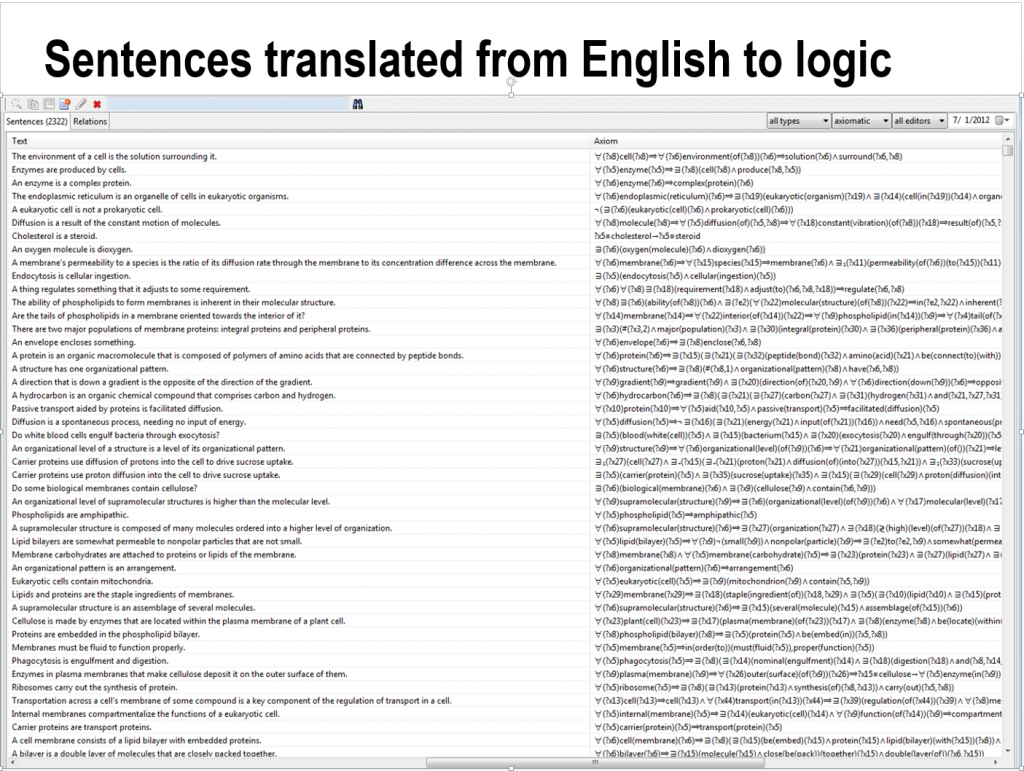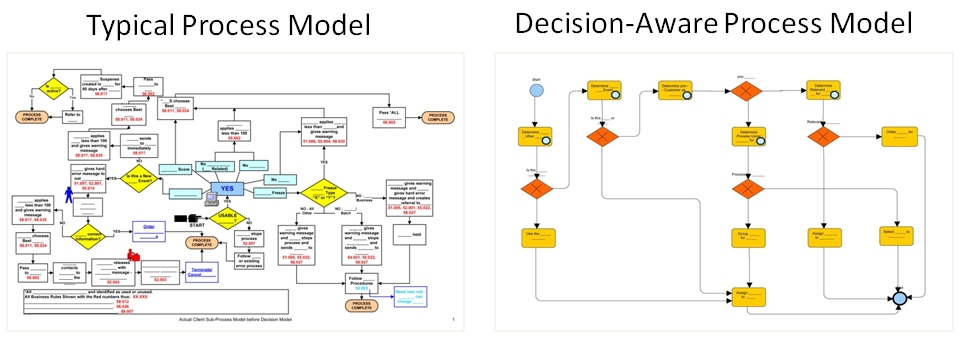As noted in prior posts about Project Sherlock, we have acquired knowledge from a biology textbook to build the business case for applications like Inquire. We reported our results at SemTech recently. The slides are available here.
Project Sherlock
Working as part of Vulcan’s Project Halo[1], Automata is applying a natural language understanding system that translates carefully formulated sentences into formal logic so as to answer questions that typically require deeper knowledge and inference than demonstrated by Watson.
The objective over the next three quarters is to acquire enough knowledge from the 9th edition of Campbell’s Biology textbook to demonstrate three things.
- First, that the resulting system answers, for example, biology advanced placement (AP) exam questions more competently than existing systems (e.g., Aura[2] or Inquire[3]).
- Second, that knowledge from certain parts of the textbook is effectively translated from English into formal knowledge with sufficient breadth and depth of coverage and semantics.
- Third, that the knowledge acquisition process proves efficacious and accessible to less than highly skilled knowledge engineers so as to accelerate knowledge acquisition beyond 2012.
Included in the second of these is a substantial ontology of background knowledge expected of students in order to comprehend the selected parts of the textbook using a combination of OWL, logic, and English sentences from sources other than the textbook.
Automata is hiring logicians, linguists, and biologists to work as consultants, contracts, or employees for:
- Interactive tree-banking and word-sense disambiguation of several thousand sentences.[4]
- Extending its lexical ontology and a broad-coverage grammar of English with additional vocabulary and deeper semantics, especially concerning cellular biology and related scientific knowledge including chemistry, physics, and math.
- Maturing its upper and middle ontology of domain independent knowledge using OWL in combination with various other technologies, including description logic, first-order logic, high-order logic, modal logic, and defeasible logic.[5]
- Enhancing its platform for text-driven knowledge engineering towards a collaborative wiki-like architecture for self-aware content in scientific education and biomedical applications.
Terms of engagement are flexible; ranging from small units of work to full-time employment. We are based in Pittsburgh, Pennsylvania and Vulcan is headquartered in Seattle, Washington, but the team is distributed across the country and overseas.
Please contact Paul Haley by e-mail to his first name at this domain.
[1] Vulcan: http://www.vulcan.com/TemplateCompany.aspx?contentId=54; Project Halo: http://www.projecthalo.com/
Video introduction/overview :http://videolectures.net/aaai2011_gunning_halobook/
[2] Aura: http://www.ai.sri.com/project/aura
[3] Inquire: http://www.franz.com/success/customer_apps/artificial_intelligence/aura.lhtml
[4] tree-banking and WSD: http://www.omg.org/spec/SBVR and http://en.wikipedia.org/wiki/Word-sense_disambiguation
[5] e.g., SILK (http://citeseerx.ist.psu.edu/viewdoc/summary?doi=10.1.1.174.1796 ) and SBVR (http://www.omg.org/spec/SBVR)
What could be more strategic than process or decision management?
The folks from Knowledge Partners have a post that I found thanks to Sandy Kemsley, whose blog often provides good pointers. This article talks about the decision perspective on business rules. It makes some good points, on which I would like to elaborate albeit at a more semantic or knowledge-level.
Every language has three kinds of statements: questions, statements, and commands. There are also some peripheral types, such as exclamations (Yikes!), but in business processes and decisions only declarative and imperative sentences matter.
From a process- or decision-oriented perspective, decisions are always phrased as imperative sentences. Otherwise, the statements reflected in any business process, whether you are using BPMN or a BRMS, are declarative sentences.
Decisions are imperative sentences because they state an action to be taken. For example, decline a loan or offer a discount. It’s really pretty simple. A decision is an action. Rules that don’t take actions are statements of truth. Such declarative statements of truth are perfect for formal logic, logic programming, and semantic technologies. It’s the action that requires the production rule technology that dominates the market for and applications of rules.
The authors of the aforementioned article use the following diagram to explain the benefits of the decision-oriented approach in simplifying business processes:
The impact is very simple. If you eliminate how you reach decisions from the flow that you diagram in BPMN things get simpler. It’s really as simple as realizing that you have removed all the “if” parts (i.e., the antecedents) of the rule logic from the flow chart.
So who in their right mind would use a business process tool to express any business logic? Continue reading “What could be more strategic than process or decision management?”
Accenture, Public Policy and Governance at Oracle
Some time ago I spoke with public sector leadership at Oracle and Accenture about applications in Health and Human Services. Oracle was already my client with what was then Haley Authority (now Oracle Policy Automation) integrated within Siebel CRM. Lagan was also one of my clients who competed with Oracle and others, such as Curam Software, for public sector case management applications. It was obvious then that then market-leading approach of Curam Software, which largely relied on IBM Global Services to codify the policies that determine eligibility and levels of benefit for various programs would not be viable for much longer. Oracle and Lagan were going to change the playing field with a more accessible and knowledge-centric approach based in Haley’s natural language business rules management system.
There was a current battle going on in one state (Kansas, as I recall) among these three companies which went Oracle’s way thanks to Accenture and support from Haley. We were also working with them on a larger opportunity in Ontario. Continue reading “Accenture, Public Policy and Governance at Oracle”


